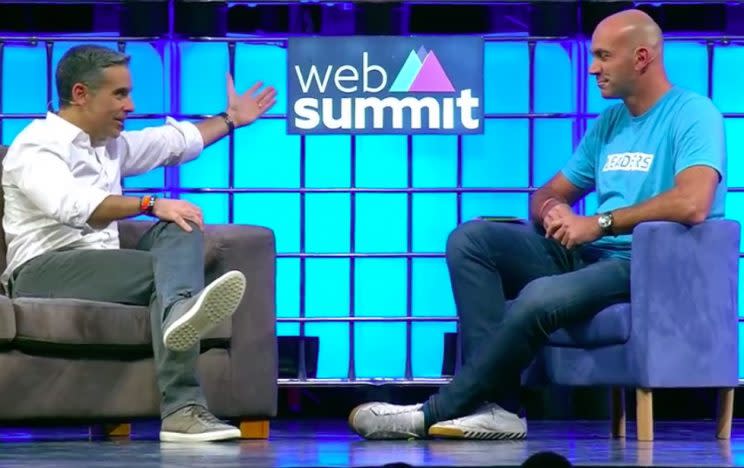Facebook’s status update: broadband bets, chattier bots, stricter security

LISBON— Rural broadband, Messenger bots and security improvements were the order of the day as several Facebook’s executives took the stage at the annual Web Summit technology conference here this week. The representatives talked about to everything from satellite-based web access for poorer countries to why you shouldn’t use the same password for all of your apps. And naturally, it was all streamed on Facebook Live for the world to see.
Bringing broadband to the world
Facebook’s chief technical officer Mike Schroepfer opened Web Summit Tuesday morning with a keynote explaining the company’s agenda for the next 10 years. Expanding Internet access to the 4.1 billion people worldwide without it is a huge part of that mission, and Facebook has projects afoot for rural, suburban and urban areas.
In the farthest reaches, Facebook is betting on satellite access — an effort set back by September’s launchpad explosion of a SpaceX Falcon 9 rocket carrying the AMOS-6 satellite that was set to provide Facebook Internet access across Africa. Schroepfer played a video of that explosion, saying “You don’t make big bets unless you have huge failures.”
Things are going better with Facebook’s solar-powered Aquila drone, a major subject of Schroepfer’s talk at last year’s Web Summit in Dublin. The propeller-driven aircraft, with the wingspan of a Boeing (BA) 737, flew for the first time in July. “A constellation of these will eventually provide the Internet backbone we need over suburban areas,” Schroepfer predicted.
In cities, Facebook is testing two systems, Terragraph and ARIES, that will provide Internet access over unlicensed wireless spectrum. That has the promise to inject some competition in a market currently dominated by cable Internet.
Schroepfer also touted Facebook’s efforts in teaching computers to recognize photos and making virtual reality a tool to connect with far-flung friends. He called social VR “the technology that’s going to enable these deep social connections over long distances.”
Banter about bots
Facebook executive VP of messaging products David Marcus also spoke at the event on Tuesday. He’s the guy behind Facebook’s launch of Messenger bots, the software-driven chat partners that even he admitted has gotten a little oversold.
“You’re right that there was a lot of hype,” Marcus said. “It’s never as good as it’s portrayed and it’s never as bad as it’s portrayed.”
He said the key to what he called “a much more complex and refined experience” than the traditional chat-bot environment of typing plain text and getting scripted replies: leveraging the same artificial intelligence that goes into the machine-vision efforts Schroepfer talked about.
Marcus made a case for bots as a new way for companies to connect with mobile users — they provide more features than many mobile sites allow, but don’t require installing a company’s app, the usual way to get around the mobile web’s limits.
The latest version of the Messenger platform, which launched on Tuesday, brings one new feature for bots: A News Feed ad can link you directly to the advertiser’s bot. But you have to click or tap that link, so Messenger spam will continue to be reserved for humans.
Security for distracted people
On Wednesday Facebook chief security officer Alex Stamos spoke about security issues in an always-connected world. Before joining Facebook last year, Stamos was the chief information security officer for Yahoo Finance’s parent firm (YHOO).
“If we’re going to connect the world, it’s also our responsibility to connect the world safely,” Stamos led off. He used the word “safely,” not “securely,” because the concept of “security” assumes the user will follow instructions all the time; “safety” also requires minimizing the damage when they don’t.
Like, for example, when they reuse passwords, what Stamos called “the number-one source of harm on the Internet.”
He endorsed using Login Approvals, where you confirm unusual logins with a code sent to your phone, and Trusted Contacts, in which designated close friends can also send you one-time codes that get you back into your account if somebody takes it over.
But what about the users who don’t bother? “We cannot say, oh, you didn’t use Login Approvals, you didn’t use Trusted Contacts, what you did is not our problem,” Stamos said. Instead, it subjects each login to the kind of scrutiny a credit-card issuer uses to detect fraud.
“We take about 80 data points from your browsing session and we feed it into a machine learning algorithm,” he said. In a moment, that math yields an answer: Is this login the real person or an attacker?
Facebook also can’t count on smartphone vendors to do the right thing. Stamos showed a picture of a popular Android phone that sells for about $65 in Nigeria and runs an obsolete version of Android, saying “that phone will probably never be patched.”
To counter that, Facebook’s app ships with its own open-source cryptography code instead of relying on the software built into Android. “We try to build self-defending apps, Stamos said.”
(Disclosure: I moderated four panels at the conference, in return for which the organizers are covering most of my travel costs.)
More from Rob:
Twitter keeps innovating, but isn’t fixing these core problems
How hackers could use your smart home devices to launch web attacks
How the government plans to make your self-driving car safer
Email Rob at rob@robpegoraro.com; follow him on Twitter at @robpegoraro.

 Yahoo Finance
Yahoo Finance 
